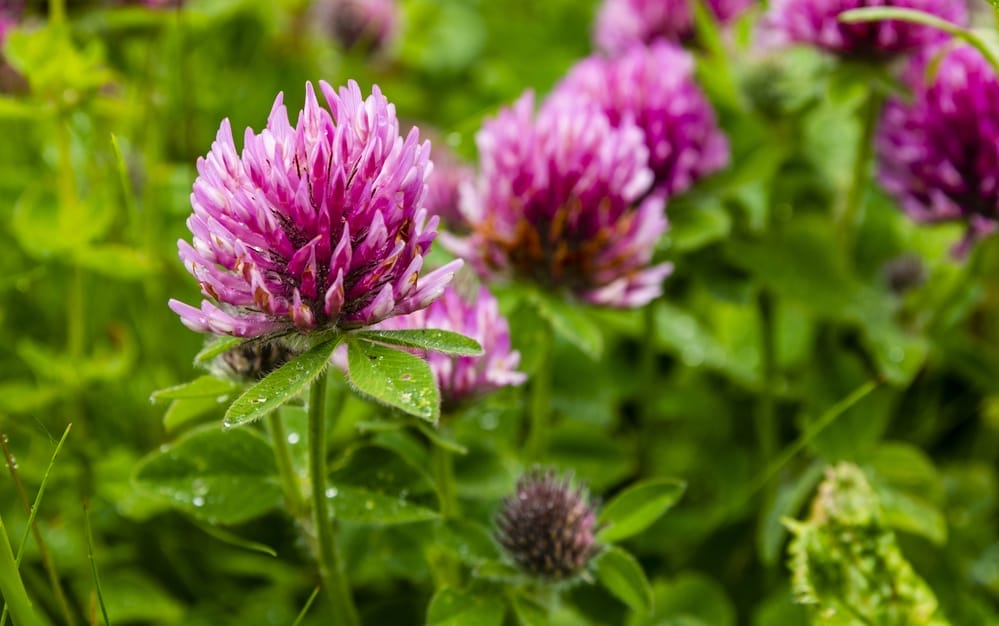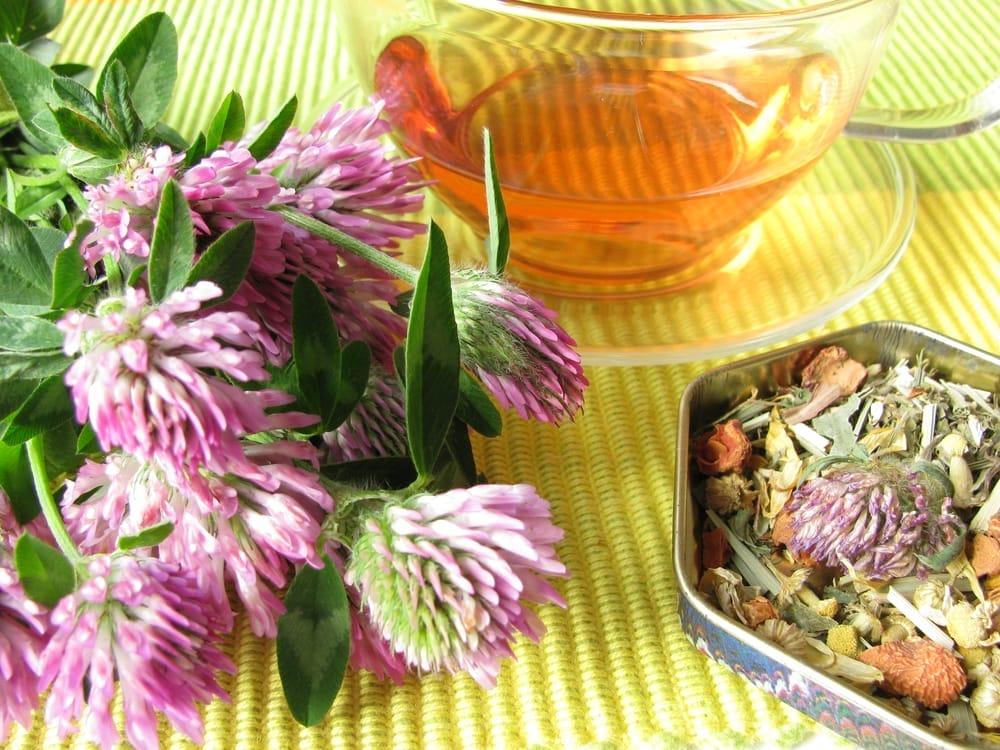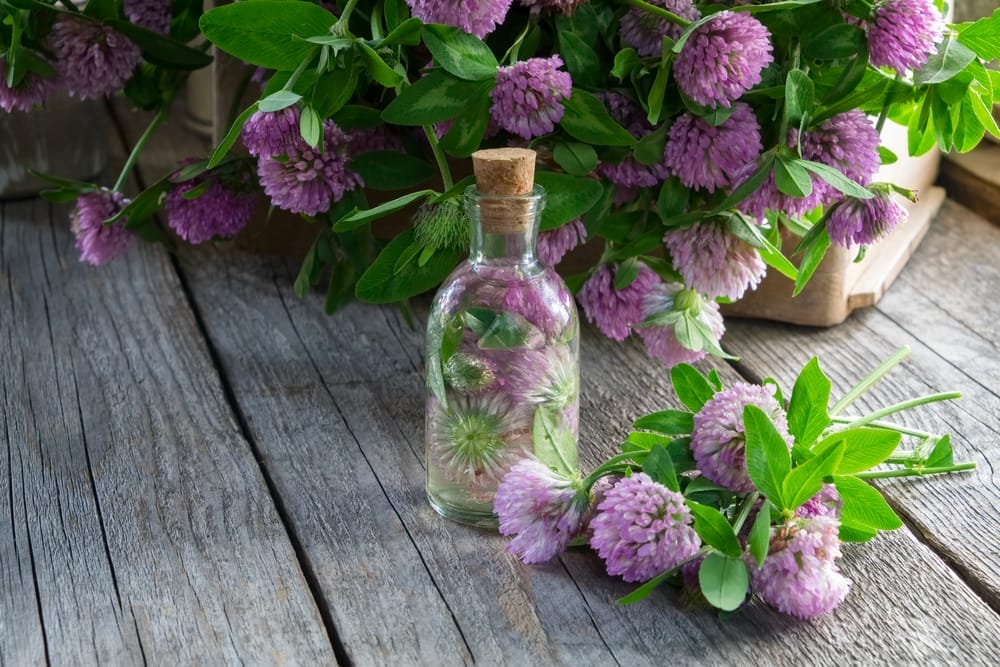Meadow clover, or red clover, is widely used in phytotherapy, and its medicinal properties are impressive in many ways. This plant is abundant in isoflavones – compounds from the flavonoid group that behave in our body similarly to estrogen. Thanks to them, it is an invaluable support for women in one of the more difficult stages of life, namely menopause. It helps regulate hormonal balance and reduces the intensity of annoying menopausal symptoms. But that’s not all. Meadow clover is also a source of many nutrients that improve the overall condition of the body and strengthen the circulatory and immune systems. Meadow clover also has no shortage of cosmetic benefits, which are definitely worth getting acquainted with.
Table of contents
- 1 Meadow clover – morphology, occurrence
- 2 Is meadow clover edible?
- 3 Meadow clover – composition
- 4 Meadow clover – health-promoting properties
- 5 Meadow clover for menopause
- 6 Meadow clover – effects on the respiratory tract
- 7 Clover as support for the cardiovascular system
- 8 Meadow clover – action. In what ailments will clover herb help us?
- 9 Red clover and its versatile use in cosmetics
- 10 How to use clover – herbs, preparations containing clover.
- 11 Red clover infusion for drinking
- 12 Meadow clover decoction (for external use, such as poultices).
- 13 Meadow clover – dosage
- 14 Meadow clover – drug interactions and contraindications
Meadow clover – morphology, occurrence

Meadow clover (Trifolium pratense), also commonly called red clover, is a small plant of the broad bean (legume) family. Of the small-seeded legumes, it is the most commonly sown and cultivated. Clover is an extremely useful component of the ecosystem, having an excellent effect on the structure of the soil. After mowing, it grows back very quickly, and its dense clusters protect the soil from the expansion of weeds.
Meadow clover is strongly widespread in our country. It grows practically everywhere, from meadows and pastures to roadsides and light forests. It is also found in other European countries, as well as in some areas of central Asia and northern Africa. In addition, it is cultivated in Australia and the Americas.
In terms of biology, meadow clover is a perennial plant (perennial) that can reach up to 50 centimeters in height, although it is usually much shorter. Its stem is erect, reddish-tinged, hairy. Its leaves are trifoliate, elliptical or egg-shaped and have characteristic, slightly lighter spots. Growing at the base of the leaves, the bracts are hairy and chinate, sometimes fused to the petiole.
Clover flowers are butterfly-shaped and have a dark pink or purple-pink hue. They are gathered in spherical or egg-shaped heads. The fruit is a small pod, inside of which there is a single seed. The root is taproot, very deeply embedded in the ground, just near the soil is heavily branched. Such an extensive root system plays an important role in stabilizing the soil. The plant blooms from May to September.
Meadow clover is a strong plant endowed with high nutritional value. It is one of the most valuable raw materials for animal feed. Moreover, it is a melliferous plant very often visited by bees and bumblebees. Clover honey, valuable for health, is produced from nectar collected by bees from clover flowers. Unfortunately, nectar from clover, due to the characteristic structure of the flowers (dense corolla and long calyx tubes), is difficult to obtain, so pure clover honey is rarely found.
Is meadow clover edible?
Meadow clover works well as a versatile culinary addition to many dishes. All parts of the plant are edible. Leaves and flowers can be eaten raw and cooked. However, the root of meadow clover should not be consumed raw. It should be cooked first.
Flowers and leaves of meadow clover have a very delicate taste, in which you can find nutty and herbaceous notes. These parts of the plant are great as an addition to salads, soups, one-pot dishes, omelets, salads, pastes, sandwiches, toast. It is recommended to collect the flowers and leaves of young ones, as they are the tastiest and most nutritious.
Dried red clover flowers can be used as an addition to herbal or fruit teas. Ground dried flowers can be used as a seasoning for meats, sauces, vegetable dishes, soups or other dishes.
Very importantly, the clover you want to use in cooking should only be harvested in clean, unpolluted areas. Like any product, it should be consumed in moderation and after checking for contraindications.
Meadow clover – composition
Meadow clover, this filigree plant with purple flowers in the form of needle-like balls and original three-leaved leaves, is not only an ornament of meadows, gardens and forests. It is also a valued herb in natural medicine with a rich composition. Phytoestrogens come to the fore here, thanks to which the plant is renowned for reducing symptoms of menopause. However, this is only the beginning of its health benefits.
Valuable phytonutrients contained in meadow clover:
- Phytoestrogens (isoflavones), including genistein, biochanin A, formononetin and daidzein. Isoflavones are perhaps the most important active ingredient in meadow clover. They are compounds from the flavonoid group that show the ability to bind to estrogen receptors in the human body. Mimicking estrogen, they reduce the intensity of ailments characteristic of a decrease in their levels in the body.
- Tannins – have astringent, anti-inflammatory properties, soothing irritation. They accelerate tissue regeneration, also help neutralize bacteria and other harmful microorganisms.
- Quercetin, kemferol, luteolin and other flavonoids – phytochemicals from the polyphenol group, showing many beneficial properties, including strong antioxidant and anti-allergenic properties.
- Saponins – reduce inflammation, have diuretic and detoxifying properties, improve digestive processes.
- Phytosterols – have a beneficial effect on the cardiovascular system, helping to lower blood cholesterol levels by blocking the absorption of cholesterol from food. They also have positive effects on the endocrine and genitourinary systems.
Also worth mentioning, meadow clover also provides the body with many vitamins. It contains, among others, vitamins C, A and E , which are powerful antioxidants, and B vitamins that take care of the proper functioning of the nervous system and the good condition of the skin and mucous membranes. Clover also contains many minerals important for health, including calcium, potassium, magnesium, iron, selenium, chromium and phosphorus.
Meadow clover – health-promoting properties

Meadow clover is a versatile herb. It can be both a part of the menu and a natural support for health. The active ingredients it contains have a pronounced positive effect on various areas of the body’s functioning. Therefore, it is worth including it in your diet and your home collection of herbs and medicines.
Here is a list of the most important health properties of meadow clover, thanks to which we will improve our psychophysical condition:
- stabilizes the body’s function during hormonal fluctuations, including menopause,
- exhibits cardioprotective and hypotensive properties,
- improves skin condition,
- lowers the concentration of cholesterol in the blood,
- has anti-inflammatory effects,
- has antioxidant and anticancer properties,
- strengthens immunity,
- alleviates symptoms of allergies,
- has antibacterial properties,
- reduces the risk of osteoporosis,
- helps maintain normal body weight,
- counteracts skin diseases,
- acts as a disinfectant,
- supports the digestive, urinary and respiratory systems.
Meadow clover for menopause
Along with hops, flax, soybeans, alfalfa and mallow, meadow clover is one of the best sources of phytoestrogens, which, being abeing a plant copy of our natural estrogens, help restore hormonal balance during menopause. They alleviate many menopausal discomforts, including the most common ones, such as hot flashes, excessive sweating, emotional disturbances, mood swings, irritability, tearfulness, increased nervous tension and excessive feelings of stress.
Noteworthy, regular use of clover preparations during menopause can reduce the risk of osteoporosis. Why? Because the isoflavones in this plant stimulate the activity of osteoblasts, or bone-forming cells, while inhibiting the activity of osteoclasts, or bone-depleting cells. Thus, they influence the increase of bone density.
Isoflavones simultaneously stimulate the secretion of prostacyclin, which is an important factor in lowering blood pressure and inhibiting the formation of blood clots.
These actions are very important for women during menopause. They are then particularly vulnerable to bone density disorders and cardiovascular function problems.
Phytoestrogens contained in clover also improve overall well-being during menopause and counteract the decline in libido. What’s more, they reduce headaches and joint pain and help restore adequate vaginal lubrication. Thanks to these properties, clover can significantly improve the quality of life in a menopausal woman.
Meadow clover – effects on the respiratory tract
Known mainly for supporting the health of women who are at the stage of menopause, red clover is also proving to be a valuable ally in minimizing respiratory ailments.
The plant exhibits good expectorant properties, thanks to which it dilutes mucus lingering in the respiratory tract and facilitates itsat facilitates its expulsion from the body (by stimulating the secretion of mucus and increasing the movement of airway epithelial cilia). It also reduces irritation of the mucous membrane and has a protective effect on the upper respiratory tract.
What’s more, thanks to its high content of compounds with anti-inflammatory and antimicrobial properties, including tannins, saponins, flavonoids, riparian cloveralso helps to extinguish inflammation in the respiratory tract and inhibit the growth of pathogenic microorganisms.
Thanks to all these activities, clover shortens the duration of upper respiratory tract infections , reduces persistent symptoms and provides relief from cough (dry and wet), rhinitis, sinusitis, pharyngitis, bronchitis. At the same time, it benefits the immune system.
Clover as support for the cardiovascular system
Meadow clover also has a beneficial effect on the circulatory system. It increases the elasticity of blood vessels, protects against cardiac arrhythmias, and helps normalize blood pressure. Thanks to the high amount of antioxidants, it protects the cardiovascular system from the harmful activity of oxygen free radicals. Moreover, by inhibiting the absorption of cholesterol in the small intestine, it promotes the improvement of the lipid profile.
Meadow clover – action. In what ailments will clover herb help us?
The beneficial effects of clover on the body are mainly the result of its high content of phytoestrogens, phytosterols, saponins and a couple of other active compounds. Here’s what ailments meadow clover can be particularly helpful in:
- menopause,
- high cholesterol,
- hypertension,
- urinary complaints,
- premenstrual tension, painful menstruation,
- skin irritations and infections, itchy skin, rashes, eczema,
- seborrhea, acne, dandruff,
- hyperpigmentation, skin redness,
- loss of skin firmness and elasticity,
- mood disorders, sleep problems,
- hormonal disorders,
- respiratory infections, cough, asthma,
- joint pain,
- bone weakness, increased risk of osteoporosis,
- allergies.
Red clover and its versatile use in cosmetics

Red clover is a plant aide against many skin problems. It helps to gain a better condition and healthier appearance of vascular skin and acne-prone skin. It is also excellent for sensitive skin, mature skin, dry skin, tired skin and skin lacking vitality. The raw material has good regenerative, firming, antioxidant and nourishing properties, so it can delay the skin aging process. It also effectively soothes irritation, stimulates the production of collagen and elastin, moisturizes and protects against harmful external factors.
Due to its excellent anti-aging and skin care properties, red clover extracts can be found in many creams and serums with smoothing, wrinkle-reducing and revitalizing properties. However, that’s not all. Extracts from this plant are also often included in preparations that alleviate the symptoms of acne.
This is because clover exhibits strong anti-inflammatory, antibacterial and skin blemish-eliminating properties while soothing, smoothing, fighting burning, normalizing skin functions and regenerating. These properties make it extremely helpful in the care of problematic acne-prone skin. Noteworthy, clover also works well in regulating sebum production and narrowing enlarged pores, which will be appreciated by acne sufferers, as well as owners of combination and oily skin.
Meadow clover extracts can be an effective method for reducing skin discoloration and evening out skin tone. The plant dulls redness, brightens the complexion and reduces the appearance of pigmentation spots, resulting in healthier and more radiant facial skin.
As it turns out, the application of red clover extracts can benefit not only the skin, but also the hair. If one is looking for a plant-based remedy for weakened hair or hair that lacks bounce and vigor, one should pay attention to the possibilities of clover.
Red clover strengthens the structure of the hair and eliminates such phenomena as brittleness, breakage and split ends. Regular use of preparations containing extracts from red clover increases the resistance of hair to mechanical damage. The herb also stimulates hair growth and inhibits hair loss. Among other things, it counteracts excessive hair loss due to hormonal disorders, including androgenetic alopecia (thanks to its ability to stabilize hormonal balance).
In addition, meadow clover helps maintain the proper level of hydration and elasticity of hair. It improves their condition, makes them easier to style, and makes them softer and shinier. The plant also has a beneficial effect on the condition of the scalp. By normalizing the sebaceous glands, it counteracts excessive oiliness.
How to use clover – herbs, preparations containing clover.
Meadow clover is commercially available in several variants, including in the form of dried herb, from which infusions and decoctions are prepared, and in the form of multi-ingredient or single-ingredient dietary supplements. Such ready-made preparations in the form of capsules or drops are usually equipped with highly concentrated clover extracts, so they provide higher doses of active substances and work more intensively than herbal teas. Nevertheless, whether we choose dried clover herb or clover supplements depends on our individual preferences and health goals.
Red clover infusion for drinking
Pour 1 tablespoon of dried herb or flowers alone over 1 cup of boiling water. We cover and wait 10 minutes to infuse. Strain and drink.
Meadow clover decoction (for external use, such as poultices).
Add 2 or 3 tablespoons of clover herb to half a liter of boiling water. Boil covered for 15 minutes. Set aside to cool, strain. The decoction can be drunk (half a glass 3 times a day), used to rinse the mouth and throat, or soaked in gauze and used externally as a compress, poultice (e.g. for bruises, irritations, skin eruptions, discoloration).
Meadow clover – dosage
The recommended daily dose of clover is usually 1 or 2 glasses of clover infusion or 300-500 mg of clover extract per day.
Meadow clover – drug interactions and contraindications
Meadow clover should be avoided by people taking contraceptives or other hormonal drugs. The use of clover is not advisable in women with breast cancer and other hormone-dependent diseases.

